Literary Vibes - Edition CXLIV (30-Aug-2024) - POEMS & BOOK REVIEWS
Title : Tranquility (Picture courtesy Ms. Latha Prem Sakya)
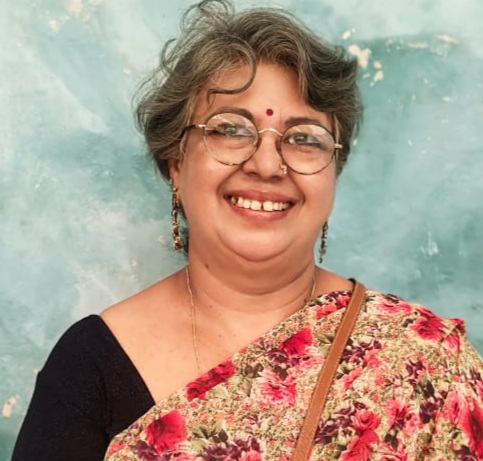
An acclaimed Painter, a published poet, a self-styled green woman passionately planting fruit trees, a published translator, and a former Professor, Lathaprem Sakhya, was born to Tamil parents settled in Kerala. Widely anthologized, she is a regular contributor of poems, short stories and paintings to several e-magazines and print books. Recently published anthologies in which her stories have come out are Ether Ore, Cocoon Stories, and He She It: The Grammar of Marriage. She is a member of the executive board of Aksharasthree the Literary Woman and editor of the e - magazines - Aksharasthree and Science Shore. She is also a vibrant participant in 5 Poetry groups. Aksharasthree - The Literary Woman, Literary Vibes, India Poetry Circle and New Voices and Poetry Chain. Her poetry books are Memory Rain, 2008, Nature At My Doorstep, 2011 and Vernal Strokes, 2015. She has done two translations of novels from Malayalam to English, Kunjathol 2022, (A translation of Shanthini Tom's Kunjathol) and Rabboni 2023 ( a Translation of Rosy Thampy's Malayalam novel Rabboni) and currently she is busy with two more projects.
Dear Readers,
Welcome to the 144th edition of LiteraryVibes. We have had a change of guard in our technical support area. Shiva, who has been a rock of support to LV right since its inception, has been blessed with a nice job. Let us thank him for the dedicated help he has rendered to LiteraryVibes for the last six years and wish him the very best in his new job. Let us welcome Suryakant, a brilliant young computer professional from Bhubaneswar, who will manage the technical support for LV from this month.
In today's edition we have a new contributor Ms. Shrabana Adhikari from Tarakeswar, West Benga who is a research scholar in English Literature. She writes excellent poetry and has also contributed a book review for LV144. Let us wish her lots of success in her literary and academic career.
August is always a month of remembrance. On this day seventy seven years back when the world slept, India awoke to freedom. A newly born nation, steeped in poverty, recovering from the trauma of partition and senseless bloodbath, had many challenges to face. The burden of building a new nation, freed from the shackles of bondage, was overwhelming. Yet, there was hope in the air and the determination to accomplish many seemingly impossible tasks. We have come a long way from there, approaching the milestone of a five trillion dollar economy, and dreaming of being among the three largest economies in the world.
Yet, for some reason I keep going back to a momentous song written by Sahir Ludhianvi, included in Phir Subah Hogi, an iconic Raj Kappor film made in 1958. The song resonated with the hopes of a new India waiting for a promised dawn of happiness, dignity and prosperity for its teeming millions. I have attempted a translation of the memorable song:
WAITING FOR THE DAWN
Mrutyunjay Sarangi
That dawn shall come someday,
Someday it will happen,
The dawn shall come,
When from the dark face of the ages
The veil of blackness shall be stripped,
When the clouds of sorrow will melt,
The ocean of joy will erupt,
The sky will dance in rapture,
And the earth will break into songs of hope,
Some day the dawn shall come,
And the light will shine.
It's the long-awaited dawn, for which
We live as we die everyday,
For whose ambrosia's melody,
We sip poison everyday.
And we wait for the time
When destiny will smile
On our famished, parched souls.
Someday the dawn shall come,
And the light will shine.
Let's accept the present
When our dreams have no worth,
But why wallow in despair
when man himself has become valueless,
Much worse than the soil he stands upon.
We wait for the dawn
When our dignity
Will not be weighed by fake coins,
Someday that dawn shall come,
And the light will shine
The dawn shall come
When women's honour
Will not be sold for money,
Love will not be trampled,
Humility will not be bartered,
And the world around us will hang
Its head in shame
For all its black deeds.
Someday the dawn shall come
And the light will shine.
The dark times will end someday
These days of hunger and joblessness
Will be a thing of the past,
Riches will no more be worshipped,
The false idols will crumble,
And a foundation will be laid
For a new, wonderful world.
Someday that dawn shall come,
And the light will shine.
The time will come
When the tottering old age
Will stop raising dust on helpless paths,
Innocent childhood will not
Beg on pitiless streets
And the just will not be silenced
By the muzzle of death.
The dawn shall come some day
And the light will shine.
I have reproduced this song with a purpose. Every year when we celebrate Independence Day with renewed enthusiasm and vigour we should look around us, across the mountains and rivers, at our nation, and ask ourselves, "Has the Promised Dawn Really Come? Have we achieved universal happiness, dignity for every man and woman and prosperity for everyone?"
Hope you will like the offerings in the present edition of LiteraryVibes. Please share the eMagazine with all your friends and contacts through the following links:
https://positivevibes.today/article/newsview/557 (Poems, Book Reviews)
https://positivevibes.today/article/newsview/556 (Short Stories, Anecdotes and Travelogues)
https://positivevibes.today/article/newsview/555 (Kids' Magic)
There are two medical related articles by the famous gynaecologist Dr. Gangadhar Sahoo at https://positivevibes.today/article/newsview/554
A happy reminder to all of you that 12 excellent short stories published in the Pooja Special of LiteraryVibes in October 2023 can be found at https://positivevibes.today/article/newsview/507
Hope you remember that all the 144 editions of LiteraryVibes can be accessed at https://positivevibes.today/literaryvibes
Take care, keep enjoying the poems and short stories from LV144. We will meet again on 27th September , the last Friday of next month.
With warm regards
Mrutyunjay Sarangi
Editor, LiteraryVibes
Table of Contents :: POEMS
1) Prabhanjan K. Mishra
WAR AND PEACE
2) Dilip Mohapatra
BINARY ALCHEMY
PASSWORD TO HEART
3) Dr.Sumitra Mishra
PIGMENT PREJUDICE
PITCH FEVER
THE DEADLY VIRUS
4) Abani Udgata
WHEN IT RAINS
5) Shrabana Adhikari
MESMERIZING AURA
6) Dr. K.Rajamouly
POETRY VERSUS SCIENCE
HARD JOURNEY
TOGETHERNESS
MAN POLLUTES THE LAND
INSPIRATION TO RISE IN ACTION
7) Avantika Singh
DANCING TO THE MAHUA
8) Dr. Viyatprajna Acharya
CHANDRAMALLI
9) Jay Jagdev
FROM A LANE ONTO THE HIGHWAY
ROOTS
10) Jaydeep Sarangi
CHANTING AT NIGHT
A DEFEATED BARD
11) Aneek Chatterjee
HE IS A MAN THE CITY HAS SHELTERED
12) Sudipta Mishra
A SOLDIER- THE SAVIOR
AN ODE TO MY MOTHERLAND
13) Braja K Sorkar
COCOON
CONVERGENCE
BURNING
JOURNEY
14) Soumen Roy
CLOUDS
15) Arpita Priyadarsini
ALPHABETIC MISERIES
16) Bipin Patsani
THE SEVENTH FLEET IN THE INDIAN OCEAN
THE DATE
ALL ABOUT A RING
FLASHBACK
17) Protiva Rani Karmaker
TRIBUTE TO WOMEN
18) Dr. Nanda K. Biswal
THE LONELY MOUNTAIN
19) Dr. Rekha Mohanty
GRAINS OF SAND
20) Matralina Pati
RAINFALL
21) Rudra Pati
TO THE MOTHER
22) Anjali Sahoo
THE RAINBOW
23) Ms Gargi Saha
THE BRIDGE
LOVE
24) N Rangamani.
SACRIFICING FLOWERS, AND....?
25) Setaluri Padmavati
DESTINY
26) Muthusami Annamalai
RIVERS, TO THE POINT OF NO RETURN, REVERSE
27) Mrutyunjay Sarangi
A FREEDOM SONG
Book Review
1) THE BARD AND HIS SISTER IN LAW
Ms Gargi Saha
2) A LIFE UPROOTED
Shrabana Adhikari
POEMS
Prabhanjan K. Mishra
When all the hate mongers
have washed dirty linens,
all the strife renderedthemselves
into ashes,
the wars have been fought,
lynching done invoking the holy.
The flesh rots and stinks
as it always did, honestly.
As women menstruate,
receive holy communion, conceive,
carry and deliver the future.
Pain festers as dear ones die,
survived by grief and repentance.
I know - Flowers would bloom
as beautiful.
Butterflies as soft and quick as ever.
Lovemaking andorgasms
as honest as revealing
asclimaxes to our stories,
as alwayson cloud nine.
Hope as bright.
Tears as speaking.
Sea and the sun as dumb.
(END)
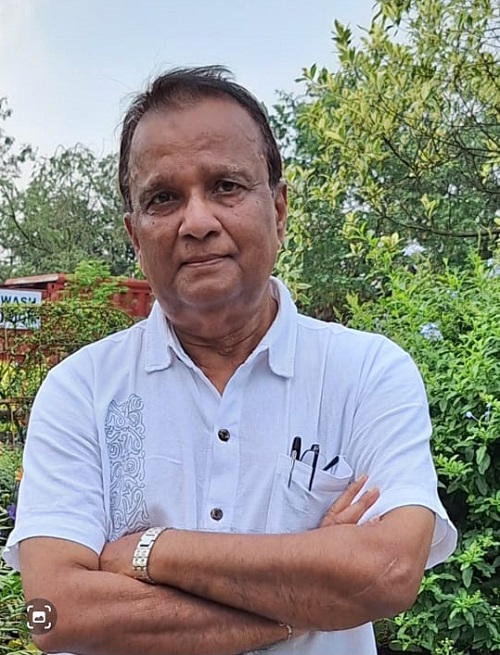
Prabhanjan K. Mishra is an award-winning Indian poet from India, besides being a story writer, translator, editor, and critic; a former president of Poetry Circle, Bombay (Mumbai), an association of Indo-English poets. He edited POIESIS, the literary magazine of this poets’ association for eight years. His poems have been widely published, his own works and translation from the works of other poets. He has published three books of his poems and his poems have appeared in twenty anthologies in India and abroad.
Dilip Mohapatra

‘ Mirror, mirror
on the screen
where pixels pirouette
and pixels gleam
I seek a younger
smoother me
a digital facelift
if you please.’
The app deploys
its secret code
and lo and behold
my wrinkles vanish
the crow’s feet gone
skin bestowed with
a youthful glow
and grace never seen before
and shows me on a golden throne
attired in full
royal regalia
a virtual spell
but I would never
come to know
of the laughters it may compel!
For now I’m not just me
you see
I’m half my age
or maybe less
a thick mop of
well groomed hair
crowns my head
my eyes are wide
and sparkling
my cheeks are rosy
and deliciously plump
a Snapchat filter’s
dreamy lump.
I share my newfound
visage bright
on Instagram
and Facebook
with overwhelming delight
and friends exclaim,
“What sorcery!
Time stands still for you’
and the post gets
unprecedented likes.
But deep within me
a chuckle stirs
for AI can’t mend life’s little slurs
the laughter lines
the stories told
the memories etched
in hearts of gold.
So let the pixels
play their game
and let the filters bear my name
but truth be told
I’d rather keep my wrinkles
and the receding
hairline
and be bold
to be seen as
what really I am
mature
wise and old!
Dilip Mohapatra

He was lost in thought his eyes dreamy and out of focus
scratching his head he wondered
"What's the magic locus?"
To unlock her heart the key he had to find
for she'd said, "No entry without the password dear
it's one of a kind!"
Not "1234" or "password" plain
nor "I love you"—too obvious
too trite too much in vain.
He tried "chocolate," "flowers”
and "romance" with flair
but each attempt met with a stern rebuff
a "not quite there!"
"Try harder," she said with a playful grin
"Think deeper, think wider, think like a poet within."
He pondered long through nights
and through days,
"What phrase could unlock
her heart's secret door, and make her sway?"
"Is it 'forever'?" he asked with a sigh.
She laughed and shook her head
"Not even close, try again, guy!"
"Maybe 'laughter'?" he ventured with hope
for humour, he knew, was her favourite scope.
"Warmer," she said, "but still not quite right.”
He scratched his head some more
his patience wearing thin in the night.
Then one day, with a mischievous grin
he typed a word, long and thin.
“Antidisestablishmentarianism,” he declared with pride
but she just giggled and continued to hide.
The next day in a moment of pure jest
He typed a word and his heart found rest.
The lock clicked open
her heart was revealed
and he waited with bated breath
his heart’s flutter concealed.
Her heart was finally revealed
she smiled and said
"Well done! You finally got it right!"
For love it seems is not just grand gestures
but it just happens
as you suddenly stumble on it and then
… OOPS!
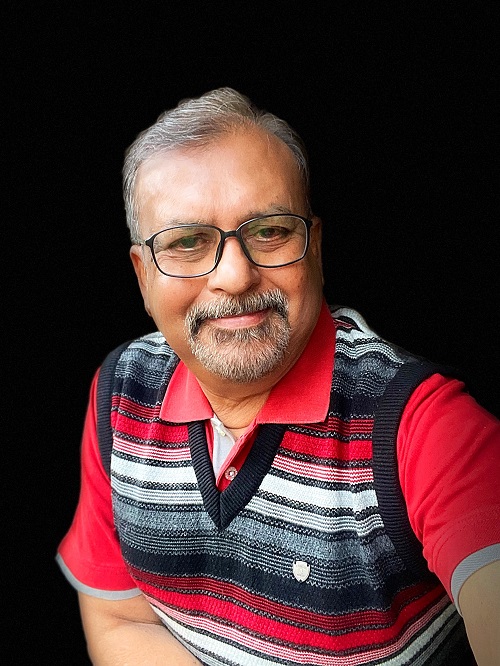
Dilip Mohapatra, a decorated Navy Veteran is a well acclaimed poet in contemporary English and his poems appear in many literary journals of repute and anthologies worldwide. He has seven poetry collections, one short story collection and two professional books to his credit. He is a regular contributor to Literary Vibes. He the recipient of multiple awards for his literary activities, which include the prestigious Honour Award for complete work under Naji Naaman Literary Awards for 2020. He holds the honorary title of ‘Member of Maison Naaman pour la Culture’. He lives in Pune and his email id is dilipmohapatra@gmail.com
Dr.Sumitra Mishra
“Fair is foul, foul is fair”
Does anybody care for Shakespeare?
The pigment prejudice
Once whirring like a whisper
Now whips the whims of every
Girl, boy, kid, man, woman,
Like the whirling bird!!!
Not only the brides to be
Or bridegrooms to be,
Want to shed
Several shades of their skin,
Trying all art and craft,
The deshibesan, haldi, chandan
Or the videshi spa, bleach, facial or mask
Trying to look fair and lovely
But every Dick and Harry
Sahrukh and Salman, Shyam and Ram
No bars or booms!!!
Is it a fad?
A social compulsion?
An unwritten yet apparent
Conventional demand
Of the marriage market?
Or is it just the ego,
Feathers to add
In the vanity fair of Facebook?
Some say it is the ethical rule
Looking good is feeling great
Or is it the pigment prejudice
Of an Albino nation?
Who cares for the
Dusky beauty?
The olive skin is
A pitiable thing
In the Barbie- crazy world!
Faking sham religiosity
Blinded to God’s dark skin
A nation that
Worships the Krishna,
The Black Lord Jagannath,
The Black beauty Kali
Blighted in morality,
Aren’t they, we all?
The melanin led melancholia
Has invaded the haughty
Flaunting crazy civilization,
I wonder
How the darkness
Has spread into the hearts!
No distinction between
The fair who is foul
And the foul who is fair
Everyone thinks
Fair is lovely
So be fair, be lovely!!!
Dr.Sumitra Mishra
They shine like stars on the green turf
Pele, Maradona, Ronaldo,Messi, Mbappe,
Fighting classic contests on the football field
Their countries they champion and shield.
Be it Argentina Brazil, Morocco or Japan
Australia, Senegal,Turkey and France
It’s the fans in red blue, white or green
Who create the fever and rule the scene!
The excitementon the pitch never fades
When the whistle blows or thefoul raids
Though the penalty decides the winner of the game
But the feverish fans demand their country’s fame!
Who knows who would lift the football World Cup
Who will get the golden boot or the golden cap
Matches in packed stadiums feverish with frenzy
Created the pitch fever and made the globe crazy.
It’s not only the force of will and the skill under test
The countries conquered or vanquished did their best
But the fans make the hero, be it Mbappe or Messsi
The pitch fever can be felt if matches you don’t miss.
Fairy tale victories or disappointing defeats
Inspiring goals and despairing misses
Be it the field goal or the corner kick
The audience shouts, jeers, jabs.
This World Cup surely raised the temperature
Of nations and fans, of FIFA and Fernandez
Be it the price of tickets or the yacht of Dubai
The packed hotels or the free flow of whisky
It proved that all are equal on the field
BPLcountries or thesuper richhad to yield!!
Dr.Sumitra Mishra
Dancing the tarantella of Death
Came a deadly virus from the East
Corona its name, Wuhan its birthplace.
Determined to defeat
All the other evil viruses, killer bacteria,
Wagging its sanguine mane,
Wreaking havoc in the globe,
It challenged
The supreme creature of this Earth
Man and his creative imagination
His technology and scientific vision!
Bending their heads in shame
In a lab tray sat the miffed micro-organisms,
Gossiping about the scathing bite of the needle
The soft white smooth body of the cotton wool
And the terrifying stench of iodine, benzene and Dettol.
Laughing out mockingly at the parasites
Thumping its chest like the Sumo fighter
It roared like the thunder, “Do you hear me?
Ye all viruses, bacteria, fungi and protozoa,
I am the roughest, toughest and strongest
In the world of pathogens,
Crown me the King!”
Someone from the gallery shouted,
“Don’t boast, dear cousin,
Have you seen those factories and machines
Those syringes and needles,
Those bottles of liquid medicine
And tablets on the shelves of druggists? “
Corona-19 grinned “Ha-Ha-Ha” like Ravan
And shouted,
“No injection, no drugs, no vaccination can defeat me
I have seized the world, the malls, markets, roads and rails
I have goaded men into their holes away from the streets
I have punished them for their cruelty and greed
I have punished them for their voracious appetite
Consuming animals, beasts, birds, and insects
Despite the bounties of Mother Nature
Fruits and roots, leaves and vegetables,
For stealing the milk and eggs, killing the fish and crab
Their hunger is unlimited, their thirst unquenchable
It’s time for them to reap the result of their cruelty!”
The Tuberculosis bacteria now thin and desiccated
Peered frightfully at the octopi-an stings of Corona
Wept in joy and descended from the throne to greet Corona
“You are the monarch of our kingdom, dear grandson,
We admit, you are the strongest infectious killer bug among all of us,
We had tried our best to defeat them, those voracious creatures,
But me, your sister Ebola, brothers MERS and SARS have retreated in fear
Your ancestor Small pox, Chicken pox, Measles, Mumps, Polio
Have been quashed by vaccination, needles and drops
You are our only hope to fight with men
And wipe them from this planet,
You have to carry our banner
And rule this dirty polluted Earth.”
A pro-biotic pathogen sneered
At the hapless debilitated bacteria and viruses,
And shouted out, “No, not all of us are vicious like you,
Trying to deform or derange the mankind, our kind host,
Look at me, how admired I am for fighting with your clan,
Remember, we are a superior race, we protect!”
Another microbe cheerfully patted his thighs and boasted,
“See I am highly prized and praised
For killing you and the cancerous cells in men
So I’m placed in the rich men’s shelves and fridges
To guard against those vicious fungi and algae
The poisonous breeds, parasites and pests.”
With its jumping, hopping viral teeth
Corona ascended the throne
Beating its breast in pride
Declared Corona-19

Dr. Sumitra Mishra is a Retired Professor of English and a bilingual writer who writes in English and her mother tongue Odia.To her credit she has published six books of poetry titled PENELOPE'S WEB, FLAMES OF SILENCE, THE SOUL OF FIRE, STILL THE STONES SING, THE RED MOON, ROSES AND BRUISES, and a short story titled REMENISCENCE.
Dr. Mishra has also written poetry, short stories, plays and translation books in her mother tongue. Her poems and stories have been published in many reputed magazines and e-zines in both Odia and English.
She is editing a women's magazine in Odia titled SMRUTI SANTWONA. She is a life member of Odisha Lekhika Sansad. She is an avid blogger and her blog is www.Smiling Sumitra.com, where she posts videos of her English and Odia poetry as well as short stories and chants.
Abani Udgata

When it rains on them, the trees
frown in fake, caught-unaware anger,
rain-bits of wet sky tumble down
the midriff of leaves to the earth.
I wait breathless for it to descend
hard till the soul of the cloud
blankets in a thick cloak
the contours of my world.
Till neighbourhood tree looks
a shadow in a dream and
the birds perched dissolve
in the colour of the water.
Till the boiling waters of
the inner rivulets frothing
with a million mutinies, subside.
For years it rained acid
in refugee camps where
naked children gathered ashes.
It rained blood from innocent sky
on green paddy fields .
It rained fire on sleepy hamlets.
It rained on empty days and
infertile nights of futile centuries.
Me and my children
will usher in the intense rain
to the inner courtyard and
listen and dance to rain song.
We do not want
to lose all that we love.
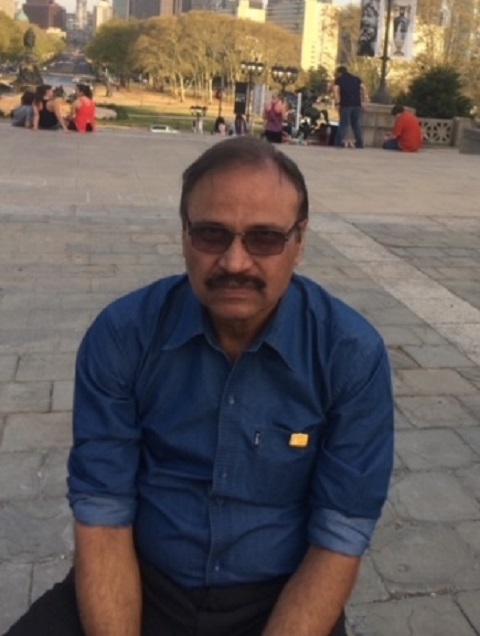
Abani Udgata lives in Bhubaneswar. Writes poems both in English and Odia. Udgata has been awarded in all-India poetry competitions and published in anthologies. He has been a regular contributor to LV. Email: abaniudgata@gmail.com
Shrabana Adhikari
The Light is born out of darkness
In an antique land of hope
With colourful feathers of senses
It plays inside the momentum.
The Light is heavy with grief
Lost within a dark alley
It pants heavily to get a harbour
Alas! it hides its face in the eternity.
The Light has an unending journey
Touching the wounds of smile
It again searches for the abode
With its withered face.
Suddenly The Light comes out
Of the enchanting suffocation
To live again in the antique land
To cure the disease of humanity.
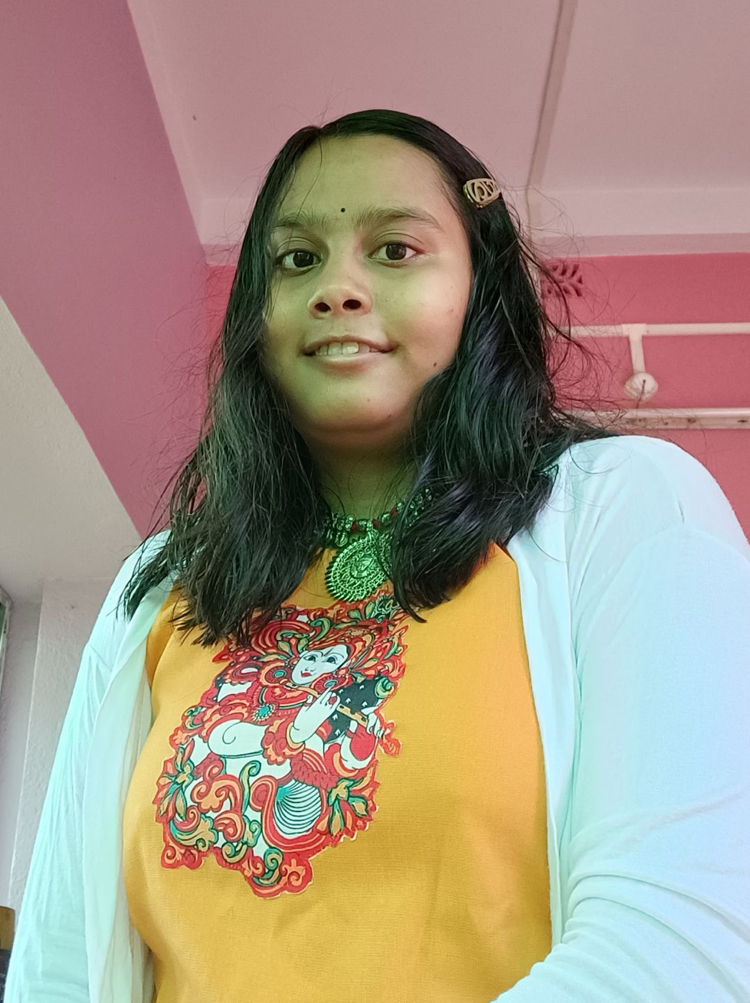
Biographical Narrative- I am ShrabanaAdhikari from West BENGAL. I am a student of English Literature. I have done M.A. IN English with B . Ed and M .Ed . Currently I am doing My Ph. D as a JRF ( Junior Research Fellow) at Gujarat University, Navrangpura Ahmedabad. My research area is South Asian Diaspora. I am also interested in Dalit literature and Plant Studies and Environmental Humanities.My hobby is to write poetry in Bengali and in English. I also sing Rabindrasangeet and I love gardening and reading fictions and Non fictions in leisure time.
Dr. K.Rajamouly
man pollutes the land,
with ‘hybrid thoughts’ for invention,
replacing all ‘original’, so grand
that are to be as standard as ‘tradition’.
in the name of modernity,
scientific progress, the days in change
all look odd and lose originality,
homogeneity in the fullest range.
there are grunts and foul smells,
to cause pollution in all respects,
all imbalances causing cries and yells,
all for suffocation in all aspects.
man for fertilizers not for manures,
for pesticides not for natural resources,
growing ambitious, he is in lures,
he can produce more, studying courses.
he is for deforestation, lands turn barren,
hillocks are in smash, hills are to vanish,
environment situation day by day to worsen,
a blemish as his ideas shine in just garnish.
all hybrid to look big and bulky,
all duplicate to fascinate all to buy,
everything artificial, milk to be milky,
with all pleasing words, sellers lie.
nutrition is rare as production is not fair,
not original to the core to claim health,
as pollution in and out everywhere
all declining indeed in seeming wealth.
Dr. K.Rajamouly
Pat for action, action for reaction,
Flux for reflux, success for smile,
Inspiration to rise in action,
All in its response to walk a mile.
A baby crawls and lisps in joy
In mother’s lovely applause-word
Toddles and plays lively with a toy,
Or doll, in father’s guideword.
Tasting of tender mango-foliage
Inspires cuckoos to sing in spring,
The sights of rainy clouds encourage,
The peacock for graceful dancing.
The lute is silent and with no notes,
Unless the strings are in touch,
With fingers and then open throats
We enjoy all, relaxing in couch.
Without the embrace of sunrays,
There is no bloom of lilies in grace,
Nightlong they wait for the ways,
That deck them with smile in face.
Guides the spirit of inspiration,
Like the stars to show paths in night
Like the compass for the destination,
To ascend the dreamed height.
Imagination dawned in mind,
Leads its musings to gush into a poem,
In the rhythmic texture in bind,
With a rheme for the treasure home.
Dr. K.Rajamouly
Science, in superiority to all other subjects,
Poses at poetry despite knowing frontiers,
For earth has gravity to pull to it all objects,
Light travels in a straight line as its barriers.
The formula: a + b whole square, for sure,
Is a-square + b-square +2ab, nothing less,
Nothing more, as per the principles pure,
And right, if anything is added, it turns mess.
The body is healthy with its temperature,
Blood pressure and all in limits is science,
The mind is a flowing fountain in stature,
Of thoughts, inklings with no limit-signs.
The fruit of poetry is wisdom as a virtue,
Like sunlight to show the ways in sojourn,
Knowledge, the result of science, a value,
As a certificate in life to get a job for a turn.
Poetry is like melodies of songbirds sung free,
Natural in outpour through sweet throats,
Science is like stringed lutes played in glee,
But artificial for they depend for their notes.
Poetry is likethe breeze to sooth all hearts,
Like the sunrays for warmth as freest offers,
Science cools all by the machine with its parts,
In a unique way as a mark of distinction, it differs.
Science is powerful in creating wonders,
But gives a room for all blunders in reality,
Poetry marks a distinction with its splendors,
In unison for the expression of beauty.
Dr. K.Rajamouly
life is indeed a hard journey,
in the path ups and downs
to bear insults and wear crowns
not for just a shelter cozy with a bed rosy,
it’s with odds and hazards in its path,
the man to cross and overcome them well,
as it’s an ascent to feel and face the hell,
for heaven wherein he never feels wrath.
it’s in the sea with ebbs and tides,
with them man is to rise and fall
for victories he is not to pose tall,
for defeats he is not to worry in its rides.
it’s a mixture of tears and smiles,
to deal with the hard is sweat on the brow,
to have smiles in the face is the glow,
as it’s a fest of dark for light all the miles.
from ignorance to enlightenment
in toil man treads and leads it for wisdom
crown indeed worth more than a kingdom,
he’s to attain the goal, it’s its real compliment.
life is a choice but never a chance,
something precious discovered in a sudden
or everythinginvaluable found from the hidden,
it should be flower to gladden by fragrance.
to live is life; to let others live is also life,
man-to-man, a clear sign of love and affection
sans jealousy and hatred, human relation
like the tree to grow and offer all sans strife.
Dr. K.Rajamouly
birds fly together for life
in togetherness to set model
separation is never rife,
as a lesson to humans t excel.
birds say ever to each other,
sky is high sans limits for jolly flight
cozy trees as our cool bower
our kingdom is between I the might.
lovers in imitation of birds
love birds to fly high into the sky
none uses to stop them using words
to beckon them to come nigh.
togetherness is everything,
of birds to live in nest as a heaven
indeed, it is the happiest living
either is not there to gladden.
flora and fauna with the ways
prove themselves to be wise,
all teach lessons like radiant rays
humans are in learning as a prize.
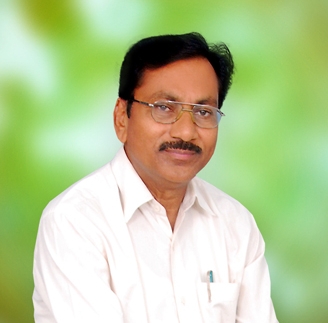
Dr. Rajamouly Katta, M.A., M. Phil., Ph. D., Professor of English by profession and poet, short story writer, novelist, writer, critic and translator by predilection, has to his credit 64 books of all genres and 344 poems, short stories, articles and translations published in journals and anthologies of high repute. He has so far written 3456 poems collected in 18 anthologies, 200 short stories in 9 anthologies, nine novels 18 skits. Creative Craft of Dr. Rajamouly Katta: Sensibilities and Realities is a collection of articles on his works. As a poet, he has won THIRD Place FIVE times in Poetry Contest in India conducted by Metverse Muse rajamoulykatta@gmail.com\
Avantika Vijay Singh
The sweet smell of Mahua transient
Cast a spell of enchantment,
Leaving my senses in utter bewilderment
At spring's wonderment.
My heart danced in abandonment
Rejoicing in the freedom from the aggrandisement
That pervades the urban continent
In chains of entitlement.
I stretched my arms in this pristine environment
Twirling about in gay abandonment
Breathing in lungfuls of the smell swelling on dawn's current
As the flowers fell gently to the firmament.
I watched the mahua fall in rapt excitement...
in its prime free of entanglement.
And my soul danced in gay abandonment
With nature in total alignment...
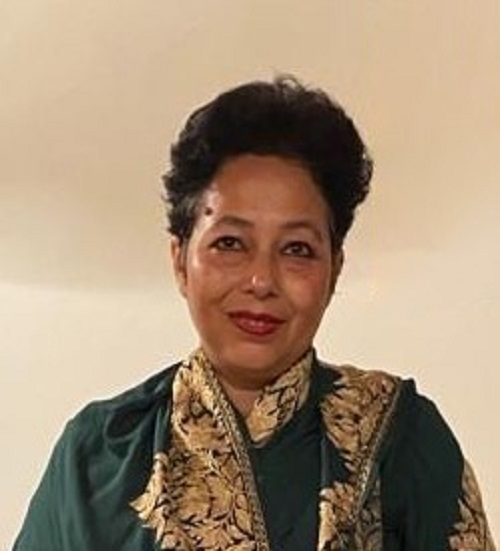
Avantika Vijay Singh is a writer, editor, poet, researcher, and photographer. She is the author of two solo poetry books i.e., Flowing… in the river of life and Dancing Motes of Starlight (her debut ebook). She is the winner of the Nissim International Award Runners Up 2023. She enjoys writing humour too for her blog “Ordinary People, Extraordinary Lives” in the Times of India.
Dr. Viyatprajna Acharya
Chandramalli twinkles
Tweaks her curvy lips
With glance cast down haan
Blushes like a china-rose;
With caution she closes,
With caution she beams…ahaa
Cautious she was enough though,
But fell for my caress…l0l
Draperadiant as moon’s
Whiffs as a jasmine
Fills my bereaved heart
With aah…some smell so enchanting;
Seems like a fairytale,
But naah…she’s so real
Cautiously she nudges says,
Go….you are one of those….l1l
She cascades like a spring
Colours my world so pink,
Guides me on golden path
reaching the pinnacle;
Seems like a fantasy
Aww…. she’s so real,
Tryst ours is no secret now
The town is talking all I2I
Alphabetic Miseries
Arpita Priyadarsini
Ambiguities of the future
Babbling through the words
Constantly pushing away
Demands of the present
Eternity exhales
Fancy words to replace
Giving away the lights &
Holding onto the darkness
Incarnating the thoughts
Justifying actions and more
Keeping our secrets buried
Loosing one's sanity
Moving on with a semicolon
Not remembering one's worth yet
Over estimating the same
Proving oneself wrong
Questioning one's existence
Regretting the present
Submerging into the oblivion
Testaments of right & wrong
Upheavaling through metaphors
Vandalizing the memories
Wooing the uncertainty
Xenial with the strange
Yearning for a myth
Zenith of belongingness

Dr. Viyatprajna Acharya is a Professor of Biochemistry at KIMS Medical College, who writes trilingually in Odia, English and Hindi. She is an art lover and her write-ups are basically bent towards social reforms.
Jay Jagdev
With the pain of the lane now in my rear-view mirror,
and the wide highway laying ahead of me,
I look at infinite hopes,
That holds promises to make up for all the lost time.
Now there is speed in my car, and air rushes through my hair,
The same road seem narrower now, nearer now what once looked farther.
Everything seems to be in order and the goals are no more a dream,
This is my dream, and with joy I am rearing to scream.
But in my rush, I had forgotten to check if my 'Palasa' was blooming this time,
that corner tea stall if it was open or is still visited by those old friends of mine.
The butts of my cigarettes laying around the place were surely mine,
I don't know if the road would allow me to return after that finishing line.
Be adaptable to change. If you insist on taking a stand; someone will move the earth under you.
Jay Jagdev
Conversations bring them back, their reputations and their fame,
they are just there nothing beyond just names.
The soil over which they walked and the air they breathed,
their footprints are long erased, absent are also the air.
They were born there, played there as toddlers,
grew up to be youths, brought home their brides.
Wove their dreams and built their homes,
lived their lives and sired children of their own.
The farther I go from the place, the more I see them standing near that hedge,
standing in a group, smiling as children as if of the same age.
There is something about the place, where my roots exist,
I see my ancestors calling me, though I know there exists none.
I wasn't born there, nor played as a toddler,
neither I brought my bride, nor did I raise kids of my own.
Born I was elsewhere, grew up in another,
always lived like a nomad, never struck root in one.
I fail to understand why that place beacons me to come,
to rest there, heal my bruised soul and call that place my home.
Standing at the middle of life seeing my kids fly,
off to the promised lands without knowing why.
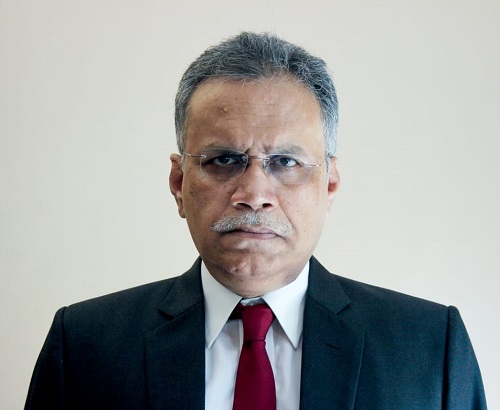
Jay Jagdev is an entrepreneur, academic and author. He is a popular blogger and an essayist. His foray into poetry is new. His essays are regularly published in Odishabytes and his poems on life and relationships have been featured in KabitaLive.
He is known for his work on sustainable development and policy implementation. As the President of the Udaygiri Foundation, he works to preserve and develop native language, literature, and heritage by improving its usage and consumption. More can be known about him on www.jpjagdev.com
CHANTING AT NIGHT
Jaydeep Sarangi
You stitch, you write
daily chores, hearts and homes,
busy with late arrivals of things with a needle,
renting out tears, moments shared.
Near an old Ganga canal here, something conjures up
some wounded nights are longer the usual. Repeating.
Passing though the needle of memories of words
you appear in funneling the sky, burning bright.
You keep chanting my name, the shining stars
through my inner being, calling you for another stint.
A DEFEATED BARD
Jaydeep Sarangi
Aged rivers of the world
bless all courtyards of love, with health.
Like flowing waters of the Ganges
men forget histories, people desiring to connect.
Old rivers with their wriggling souls
wheel the time with deep puffs of pain, unbearable.
I tear up all I have; my books, old playmates
with a honed knife and a dagger
wearing nothing, shirts of blood
oozing out of my sharp wounds.
One good morning, after years of waiting and waiting
waters of the Tigris will lift my fractured body
defeated , misunderstood and silenced
as dead on a war front into the deaf ears of love,
pierced in pieces by the needles of nightly stories.

Jaydeep Sarangi is an Indian poet with ten poetry collections in English latest being Memories of Words, poetry activist and scholar on postcolonial studies and Indian Writings with forty one books anchored in Kolkata/Jhargram,.. With Rob Harle he has edited six anthologies of poems from Australia and India which are a wealthy literary link between the nations. With Amelia Walker, he has guest edited a special issue for TEXT, Adelaide (Australia). His recent books include, Mapping the Mind , Minding The Map:Twenty Contemporary Indian English Poets , Sahitya Akademi, 2023 and A Life Uprooted: A Bengali Dalit Refugee Remembers, Sahitya Akademi, 2023. Mapping the Mind, Minding the Map ( 2023, Sahitya Akademi) is his latest book. Sarangi is currently the President of Guild of Indian English Writers, Editors and Critics (GIEWEC) and Vice President, EC, Intercultural Poetry and Performance Library, Kolkata. Living with poets and poetry, Sarangi is principal of New Alipore College, KolkataHe may be reached at: jaydeepsarangi1@gmail.com Website : https://jaydeepsarangi.in/
HE IS A MAN THE CITY HAS SHELTERED
Aneek Chatterjee

He is a man the city has sheltered.
He allows the thirsty dog to drink
water from the roadside tap, before
he drinks, in the scorching heat, this
city feels in April.
He does not want to climb the ladder;
to dream his abode in the clouds; to rush
to swanky office; to win races among rats
or on horseback. Girls talk to him, but in
unromantic tones.
He talks to white, yellow and red flowers
in his garden. Birds sing to him their favorite
tunes. He walks on city roads, dwarfed by
sky scrappers; unnoticed by citizens;
loved by dogs.
He does not think big; does not
talk big; does not consider him as
unfit in this world. He simply does not believe
in more pollution. He only wants a good sleep
in a city that has sheltered him.

Aneek Chatterjee is a poet and academic from Kolkata, India. He has published more than six hundred poems in reputed literary magazines and poetry anthologies across the globe. He authored 17 books including five poetry collections titled, “Seaside Myopia” (Cyberwit, 2018), “Unborn Poems and Yellow Prison” (Cyberwit, 2019), “Of Ashes and Persiflage” (Hawakal, 2020), “Archive Avenue” (Cyberwit, 2022) and "Last Evening Was A River" (Penprints, 2024). He also co-edited the “Poetry Conclave Year Book 2022” (Authors Press, 2022). A Pushcart Prize nominee, Dr. Chatterjee also received the prestigious “Alfredo Pasilono Memorial Panorama International Literary Award 2023”. He was a Fulbright Visiting faculty at the University of Virginia, USA and a recipient of the ICCR Chair (Govt. of India) to teach abroad. His poetry has been archived at Yale University. He can be reached at: akchatjee@gmail.com
Sudipta Mishra
Oh, my real hero, dear soldier
I owe my gratitude to you
For your selfless endeavor
Though we gaze at the heroes in pictures
But, never we bow our head in front of your dedication
Shame on us
Shame on our double standards
Let's learn from our blunders
You are the real warriors
Nobody can replace the valor
That you carry out for the glory of our future
For our bright career
Never, do you worry about your family members
By keeping their will at bay,
You struggle for us with inimical powers
Let's fold our hands and pray for you all
Let's cherish your prosperity
May we sing the song of joy for our fighters
Oh, Lord, bless these unsung heroes of our nation
Sudipta Mishra
Oh, my dear Indians
Let's take an oath to glorify our nationalism
Amidst myriads of variety
We all have seen a dream
For uniting our nation
With the thread of equality and liberty
Let's flaunt our ideals of fraternity
It's a promise for our posterity
We will withstand the external storm
To solidify the unity of Indians
For a better tomorrow
We shall move with a lofty vision
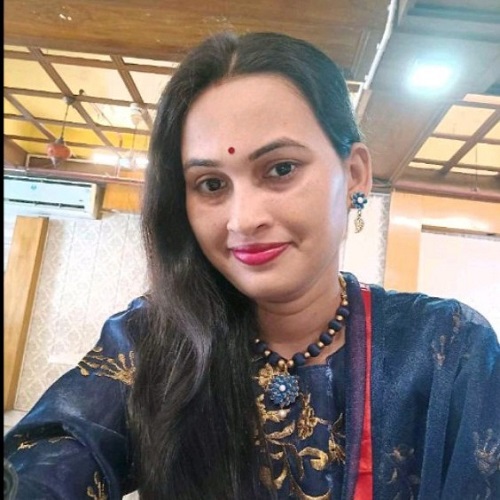
Sudipta Mishra is a multi-faceted artist and dancer excelling in various fields of art and culture. She has co-authored more than a hundred books. Her book, 'The Essence of Life', is credited with Amazon's bestseller. Her next creation, 'The Songs of My Heart' is scaling newer heights of glory. Her poems are a beautiful amalgamation of imagery and metaphors. She has garnered numerous accolades from international organizations like the famous Rabindranath Tagore Memorial, Mahadevi Verma Sahitya Siromani Award, an Honorary Doctorate, and so on. She regularly pens articles in newspapers as a strong female voice against gender discrimination, global warming, domestic violence against women, pandemics, and the ongoing war. She is pursuing a Ph.D. degree in English. Her fourth book, Everything I Never Told You is a collection of a hundred soulful poems. Currently, she is residing in Puri.
Braja K Sorkar
Jonaki, the Glow-worm,
who lives in the womb of memory,
how to teach him to cultivate silk?
Fiber memory burns with every breath.
Still, the silkworm builds its cocoon throughout the night.
I have not recited the Mantras,
I have no faith in the Tantras.
The face that I have seen for so long,
the shadow that is still cupped in the chest,
has no name.
Enchanted but who is called?
you know everything-
the vibration in the marrow,
you named it today.
How Surprising!
I see the candlelight flickering in
the inner part of that cocoon…
Braja K Sorkar
Nothing can be hidden in so much secrecy!
I am hiding this face, the color of this nakedness!
Page after page just tingles.
Entwined in the brushwood is a
breath of light, a draft of a dream.
Every day, dresses in colorful cheek tales are running.
A gloomy crow is peeping on the roof of the afternoon.
The path along which you are traveling is tangled in the
gentle light of convergence!
The trees of my terracotta garden grew by the touch of light;
Domestic air blows wildly and the mosquito net of night is
just a witness.
Whatever secret savings in the binoculars of your eyes,
let the grass wake up in the bond of the un-blooming sound,
all these green leaves are hiding the pain of the sun.
Can anyone put out the fire like this?
On the wings of hidden scents,
this evening of ours is flying around…
Braja K Sorkar
In this way,
some wonderful glimmer of light
emerges in the argument and the
darkness burns to ashes.
We who have been sitting on our knees
for so long, and brought some scars
from the body of the night,
Today,
I give everything to you, beloved fire!
May we burn like this holy darkness!
Braja K Sorkar
I don't know where the end of this journey is!
Is there any platform beyond the sea of life?
Or gray desert?
Under the layers of this life
floating on water hides pain,
love and sadness, and inevitability...
I am floating on the sea of good hope.
I have not yet reached the bottom of the sea
even today…
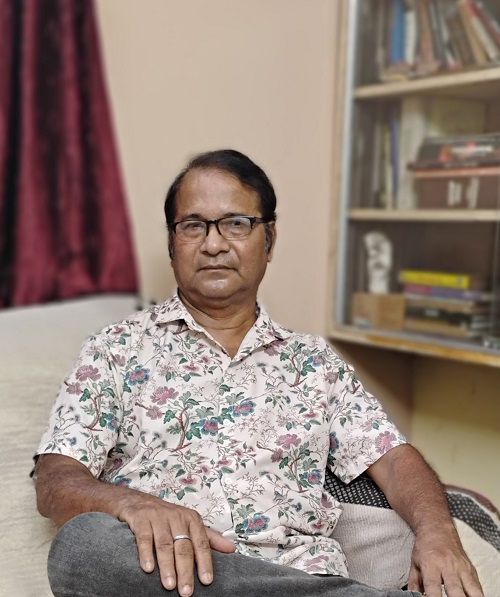
Braja K Sorkar is a bilingual author, poet, Essayist, and Translator. 10 Titles have beenpublished in his credit and a highly acclaimed poetry collection in English, titled ‘ Syllables of Broken Silence(2021) for which he received ‘The Indology Award’(2021). He has edited a prestigious literary magazine in Bengali ‘Tristoop’ since 2001 and an International English literary journal’ Durgapur Review’ since 2023. He edited an International Anthology of World English Poetry, titled’ Voices Now: World Poetry Today’ (2021). His poems have been translated into many languages. He lives in Durgapur, West Bengal. Contact: email: brajaksorkar369@gmail.com. And brajakumar.sarkar@gmail.com Whats App: 9064231839
Soumen Roy
Floating clouds to the distant lands
They perfectly gaze
Shower happiness in every droplet of rain.
Wiping every agony in the lane
Clouds often float in our lives.
Within our thoughts
They never drizzle equally.
A lack of certainty is there.
Just because of their beliefs, which hold them back.
But the azure seems limitless.
Pouring unconditionally
Connecting every soul with a faith
Happiness will flood again.
With a spontaneous spring in the garden of life
Living with fullest potential
Being a merry cloud with beliefs of possibilities
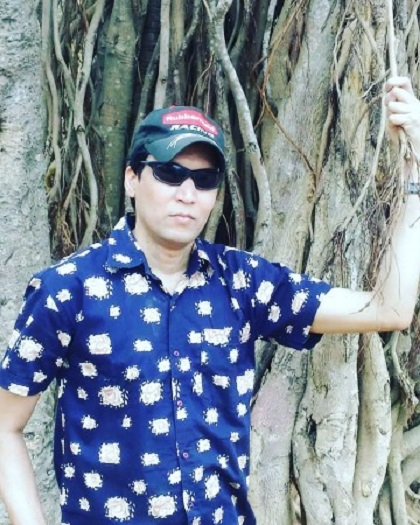
Soumen Roy is a professional writer, best selling author and a tri-lingual poet. He has been vasty anthologized. His novel and poetry books have been part of International Kolkata Book Fair as well as Newtown book fair. He is the receiptent of Laureate Award 2022 along with many others. His poetry has been a part of international poetry festival 2017 and Panaroma international Literature festival 2023. He has published in different newspapers, magazines and web portals. He has been part of a web series named Showstopperzz, a cinema for a cause. He loves photography, painting and music.
Arpita Priyadarsini
Ambiguities of the future
Babbling through the words
Constantly pushing away
Demands of the present
Eternity exhales
Fancy words to replace
Giving away the lights &
Holding onto the darkness
Incarnating the thoughts
Justifying actions and more
Keeping our secrets buried
Loosing one's sanity
Moving on with a semicolon
Not remembering one's worth yet
Over estimating the same
Proving oneself wrong
Questioning one's existence
Regretting the present
Submerging into the oblivion
Testaments of right & wrong
Upheavaling through metaphors
Vandalizing the memories
Wooing the uncertainty
Xenial with the strange
Yearning for a myth
Zenith of belongingness

Arpita Priyadarsini, a Post Graduate of Department of Statistics in Utkal University, has keen interest in literature. She loves reading fiction and poetry. She started writing poems few years back and has been published by an international publication house twice. Her Instagram handle is @elly__.writes, which is solely dedicated to her love for poetry.
THE SEVENTH FLEET IN THE INDIAN OCEAN
Bipin Patsani
Fifty stars rush from The Pacific
With aids and aspirins
To support the tired rustics
Busy in breaking
The Honeyed Oriental Eden.
And my Lucretia lies dead,
My fair poor Lucretia!
Who has trampled her?
Who has violated her modesty so brutally?
What wrong did she smuggle?
The crimson blood circles her petals
Bruised by lecherous lust.
Where shall I find my Lucretia now?
Where? Where? Where?
Answer World, answer,
Bright stars, answer.
Where shall I find my Lucretia?
If Yudhistir wins or loses a game,
Must Yajnaseni be humiliated?
Bipin Patsani
Billion stars bloom
When you glide along in memory
And I wait like a crane brooding.
I know that you won’t come
To offer me your healing presence,
Still I long for you,
I long for you and wait;
Because you only know the secret
Of my ruined realm,
Only you have the mind and means
For bringing it back to form.
If something happens?
I fear if something happened
And the tavern collapsed
Gathering debris
As in a quake or collision?
No. No. Let me think
It is some appointment
Or disruption of link
That keeps us apart.
Bipin Patsani
As a white dot
On the distant sea
Growing ashore
A distinct sail,
So appears
The warm image of my love
On the calm crimson stone
Of a ring,
Her love’s token.
Bipin Patsani
To be in the green valley of Bomdila
Is to live in flashback.
The mountains lie exhausted
And sweating naked beneath the net,
The silken turf of the cloud
Fluttering and resting sometimes
On their bashful bosom.
Dreams do patter and run
In the wilderness of the streams.
You come in the rain most often
With your music lessons
And knit foot-prints on the leaves.
I read ever-inch of your artistic move
And smell the smile of fulfillment everywhere.
Should I blacken the silver lining
With my imported ink?
Your arrival thrills me and rules out all misery,
As the southern wind dampens the valley,
Have you closed the distance
From Bomdila to Puri?
I feel every moment living with you.
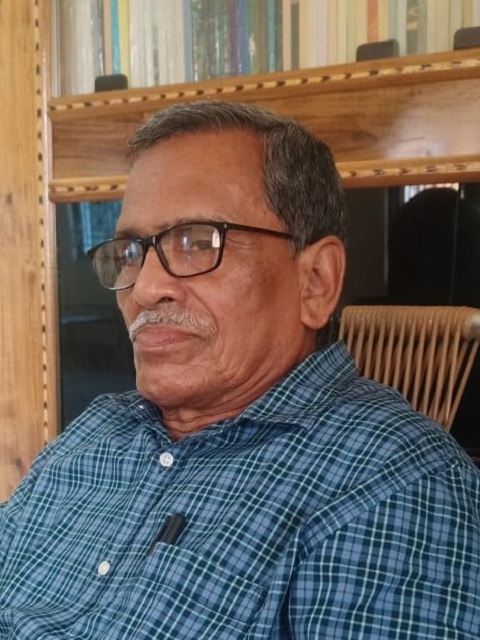
Bipin Patsani (b. 1951) has published poems in many prestigious journals and poetry anthologies including Indian Literature, Chandrabhaga, Journal of Indian Writing in English, Indian Scholar, Kavya Bharati, Poetcrit, International Poetry and Prophetic Voices etc. He has been translated to Spanish and Portuguese. He has three poetry collections to his credit (VOICE OF THE VALLEY, ANOTHER VOYAGE and HOMECOMING). He is a recipient of Michael Madhusudan Academy Award/ 1996 and Rock Pebbles National Award in 2018. He did his Post Graduation in English at Ravenshaw College, Cuttack in 1975 and served as a teacher in Arunachal Pradesh for 34 years till his superannuation in 2012. He also received Arunachal Pradesh State Government’s Award in 2002 for his dedicated service as a teacher. He lives with his family at Barunei Colony, Badatota in Khordha District of Odisha, India.
Protiva Rani Karmaker

You have seen her beauty;
You have enjoyed her ecstasy;
You have adored her existence:
You have neglected her presence;
She has always come to you;
And loved you.
She is the ray of hope;
She spreads peace like a dove.
She is the strength of society;
She brightens us with her beauty.
As a mother;
She is the torch bearer.
As a daughter;
She is the caregiver.
As a wife;
She is a positive vibe.
She needs to be taken care of,
Loved and respected by all.
She needs to be empowered,
Without her who will be there?
To spread the light of hope and care.
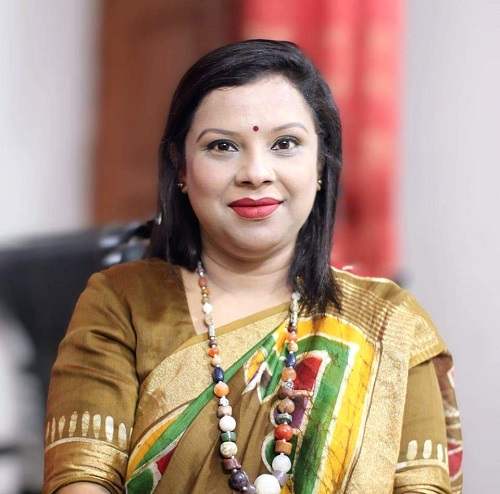
Dr. Protiva Rani Karmaker is an accomplished writer and columnist for national dailies, renowned for her contributions to education, youth development, and literature. As a professor and first director at the Institute of Modern Languages, Jagannath University, her expertise spans literature, education and research. She has authored twelve books by Bangladeshi renewed publishers, 01 book by Indian publisher, 22 journal articles and 200 columns. In recognition of her exceptional work, she received the International ERUDITE SCHOLAR 2022 award from the Council for Teacher Education Foundation (CTEF), India, and the International Award of Academic Excellence and Leadership 2024 by the Council for Educational Administration and Management (CEAM) India.
Dr. Nanda K. Biswal
Their running into each other-
a chance encounter at most-
the mountain and the river, met once
and parted ways, once and for all.
Contrary were their views and ways;
they never fitted together probably.
The mountain wears the crown of loneliness,
a state irredeemable, mysteriously foisted on him.
Nobody knows the woeful tale
surrounding his misery.
Overlooking human habitation,
stationary is his position
reminded always to stand tall.
Asto when a peaceful retreathe had
to make from the chaos of humdrum life,
very few knew.
Against will, his lips are made to be
buttoned up,an unwelcome thing
imposed by a providential whim.
He stands in imperturbable self-possession,
poised in silence like a sage of unknown age
and enormous spiritual wealth,
fully exposed to the vagaries of life.
Free of affiliations, his neutrality
transcending good and bad, dualities and polarities
he holds his ground through jeers and catcalls,
scars and bruises, both in sun and rain.
His scars evoking memories and bruises bringing tears.
He is a witness to people
growing old and perish.
Sleek and sly, full of beans and bubbly,
the river, always on the move.
Negotiating path, propelled by the power of
desire, never to stop anywhere
“till the goal is reached”.
Curvaceous and radiant,
the sunlight glistens on her skin.
Unmindfully maybe, her stumbling upon the majestic mountain,
brought them face to face.
Her touch ignited a spark of passion
sending shivers down his spine
that he revelled in
craving for more touches,
a desire remaining in supine state for long.
Tender became the moment,
love awakened like an old memory.
The ugly turned beautiful
and the mountain began dreaming of
a thousand tomorrows.
This far, no further-he proposed.
As if this went under her skin,
the playful river quipped :
“to stay put anywheregoes against my grain;
never can I imagine myself as an indolent damsel
like “darpanasundari” on a temple wall.
I have an unbridled hunger to wander;
to explore the mysteries surrounding unknown places and people”.
On her own she has come a long way,
no more wander around lollygagging.”
Lackadaisical she never is,
indomitable is her will power,
meeting the sea that explodes into laughter
every now and then, is her life’s mission.
“The sea is one like the other unhappy lot,
fathomless is its sorrow”, said the mountain.
“I can’t change your past. But can offer ways
to stop you from a disastrous future.”
“Go you can, but forgetting you won’t be easy,
for hauntingly beautiful you are
like the fragment of a melody
that replays in someone again and over again.”
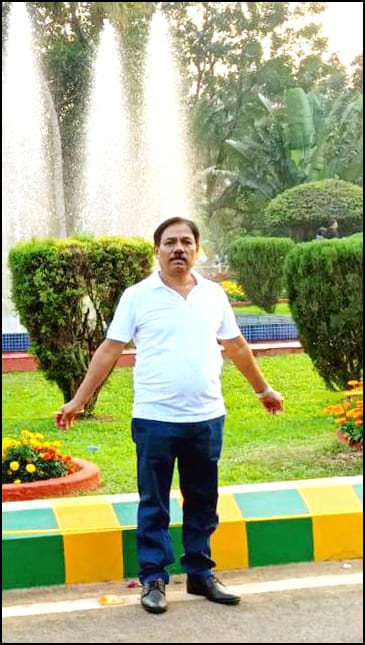
Dr Nanda Kishore Biswal, after teaching English language and literature for more than thirty five years in different colleges of Odisha, retired as an Associate professor. Passionate in reading poetry, intermittently, he has been writing poetry since his college days.1996 to1999 was his most fertile period when his Odia poems were published in almost all Odia dailies as well as in most of the Odia magazines. Also he writes English poems. He has authored The Fictional Transfiguration of History in the Novels of Salman Rushdie, Amitav Ghosh and Rohinton Mistry. Besides, he has edited Prananath Patnaik:A purveyor of Egalitarianism Currently, he is engaged in writing reviews of the poetry collections of the new poets who write in English.
Dr. Rekha Mohanty

We build castles of sand
playing gleefully on beaches,
Oblivious of the surroundings,
Engrossed and enjoying,
The child in us
gets amused
as waves wash it
away every time …
From where it had come ?
From ocean or land ?
I had never bothered
for answers,
As a child I had no questions
or inquisitions whatsoever,
Now I have seen them
in desolate deserts,
Miles and miles of sand,
With dunes of
changing shapes raised
with the fury of wind…
I remembered hearing
the grains
fiercely roar,
As they pile up
hither and thither,
The sun plays
with magical shades
on its slopes
as they disappear…
I have seen glistening sands
in beaches and shores
golden or white in colour,
That invites to relax
looking up quietly
gazing at the sky
The wet sand turns
into a reflecting mirror,
I could see on it
myriads of faces
and shadows of others…
The sand castles
I had built in childhood
never withstood
the pressure,
But it had given me
immense pleasure…
Didn’t know the
real castle needs to face
the storms of world,
Not to turn into
a heap of wet sand…
Sand when dry
slips down
from a tight fist,
But it can hold
moisture into it,
It gets cool at night,
Sand whether in desert
or in bottom of ocean
promises a hope of life…
Col( Dr) Rekha Mohanty is an alumni of SCB Medical College, Cuttack, Odisha and she has spent most of her professional life in military hospitals in peace and field locations and on high altitude areas.She has participated in Operation Vijay (Kargil war)in 1999 and was selected for UN missions in Africa for her sincere involvement in crisis management of natural calamities in side the country and abroad where India is asked to do so in capacity of head QRT in Delhi for emergency medical supplies.She had also participated in military desert operation
’ Op Parakram’ in Rajasthan border area.After relinquishing Army Medical Corps in 2009,she worked in Ex Servicemen Polyclinic in Delhi NCR and presently is working in a private multi-speciality hospital there to keep herself engaged.
Her hobby is writing poetry in English and Odia.She was writing for college journals and local magazines as a student in school.
Being a frequent traveler around the world,she writes travelogues.The writing habit was influenced by her father who was a Police Officer and used to write daily diary in English language he had mastered from school days in old time.Her mother was writing crisp devotional poems in Odia language and was an avid reader of Odia and Bengali books.Later her children and husband also encouraged.
Dr Rekha keeps herself occupied in free times for activities like painting, baking and playing card games the contract bridge.
She is a genuine pet lover and offers her services to animal welfare organisations and involves in rescue of injured stray dogs.Being always with pets at home since early childhood ,she gives treatment to other dogs in society when asked for in absence of a vet.She delivers talks on child and women health issues to educate the ladies in army and civil.
After sad demise of her husband Dr( Brig)B B Mohanty in February 2023,she devoted more time to writing and published her first poetry book’Resilient Leaf’in August 2023.Since then there is no stopping and she is going to publish her second book of poetry soon.
She enjoys reading E magazine LV , newspaper current affairs ,writing poetry and watching selected movies whenever she gets time.She keeps travelling places of interest in between for a change which is a passion as a girl since days roaming with parents and siblings .Her motto is to be happy by giving the best to self and to the society.She is lucky to have a supportive family.
Matralina Pati
Cascades of monsoon breeze
Returned along the home-bound cloud:
Soft raindrops on my doorstep did freeze
At a crimson hour
An ache named thirst has just signed out
Bio Note of the Poet

Matralina Pati, is a PhD research scholar working on marginal Indian bhasha literature (UGC Junior Research Fellow), a bilingual poet and a translator from Bankura, West Bengal. Her critical and creative writings have been published on national and international platforms. She has authored a book of translations titled Monsoon Seems Promising This Year (selected poems of postmodern poet Rudra Pati translated from Bengali into English).
Rudra Pati
Ceaselessly
Your concealed tears perfuse with
My soul and its roots;
Still, like an immobile plant
My voice and limbs
Remain muted
In Helplessness.
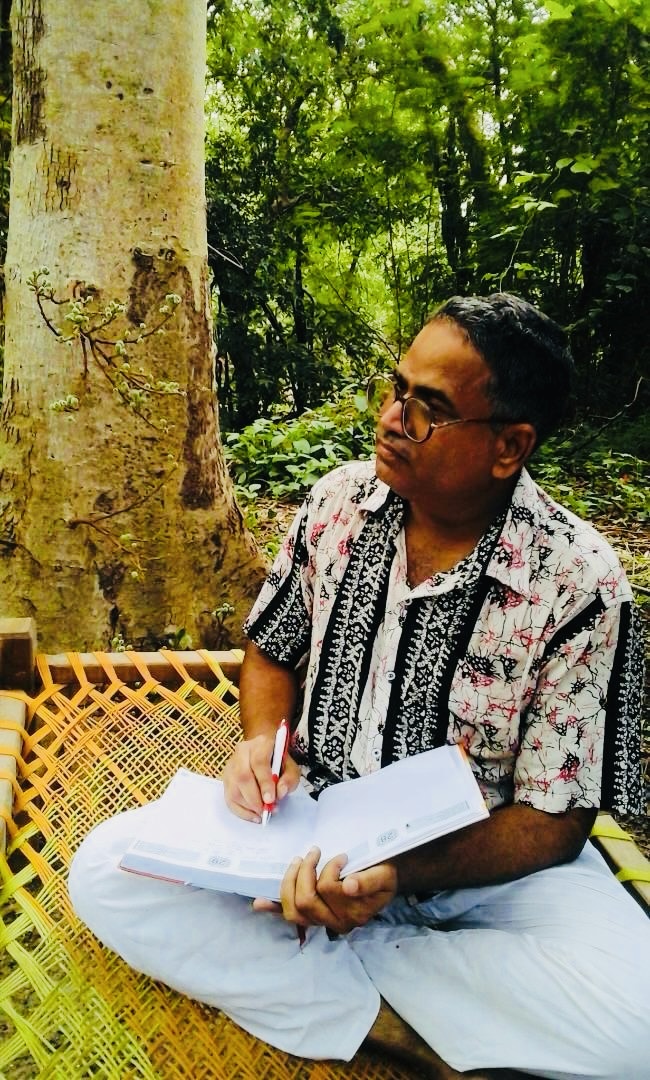
An eminent poet of contemporary Bengali literature, Rudra Pati (born in 1968) is an authentic representative of post-modern Bengali poetry. Rudra Pati teaches in a government-aided school and has a penchant for astronomy, Euclidean geometry, farming, and shepherding cattle in his native place, a drought-ridden rural region of Purulia in West Bengal. His published works include Prantik Chasha (1993), Lathe Othoba Osomprikto Hydrocarbon(1993), E Bachar Shrabon Bhalo (2004), Bekarer Kobita(2004), and Guchhomul (2005).
He was invited by All India Radio to present his poetry at Akashvani Bhawan, Kolkata. He has read his poetry at numerous literary festivals such as Paschim Banga Bangla Academy, Bangla Kobita Utsav, International Poetry Festival, Biswabangla Kabita Utsab, and many more. He is a recipient of the ‘Krishnamrittika Sahitya Award’ (1997). Rudra Pati says: "My dream shatters, yet I dream anew."
Anjali Sahoo
The rainbow is forming a lovely arc,
Like a hanging collage on wall,
His colors curl yet set and sprawl,
His smiles are a sort of ache!
He takes birth and grows old soon,
We face death? And He does cease
Mountains, moors have their own lease,
But, He shines by his tender ruin!
End and opening form a loop,
All comes, all goes- gold or dross,
In fancy’s fragments, He is a boss
Who leaves a legacy of rare coup!
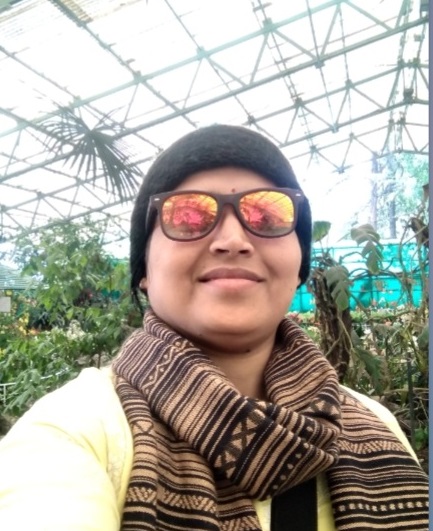
Anjali Sahoo writes poems both in English and Odia. Her first poetry book A Tryst with Thunder (2021), published by Authors Press, New Delhi, sheds light upon manifold aspects of life. They take the readers to the world of imaginative vibrancy, unearthing hidden mysteries of the world. Her published works include three poetry books and two short stories collections in Odia.
Ms Gargi Saha
Crimson skies
Black birds
Green pastures
White river flowing
And the bridge sighs
Connects the past and the future
Today dwindles in between
The bridge connects two hearts
In the Unity of Being
Love is in the air
Love builds rapports
Hatred creates walls
Bridges unite cultures, civilisation, races
How I yearn to stroll past the bridge
That harmonises the soul
Linking it to the ‘Over soul’.
Ms Gargi Saha
You came and embraced my soul
The gentle touch
The cherubic smile
The glint in the eyes
The perfume of kindness you wore.
The aura of diligence
The hall of fame and admiration
Melted my heart
Behaviour moves on
From zero to infinity
From emotions to exuberance of feelings
Physical beauty fleets, turns to dust
But beauty of the soul, attracts millions
To the shore of humanity
I wish to be surrounded
By unconditional, pure love of the unknown, unlamented
And bask in the freedom of eternity.
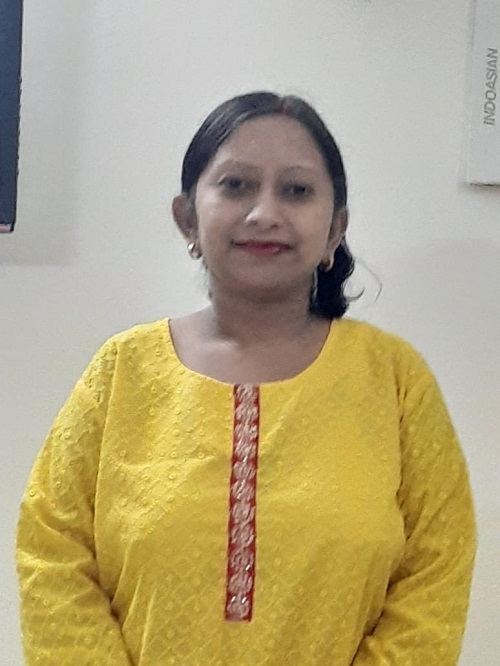
Ms Gargi Saha is a creative writer and has published two poem books namely, 'The Muse in My Salad Days ', and 'Letters to Him '.Her poems have been featured in National and International Journals. She has received the Rabindranath Tagore Memorial Award and the Independence Day Award for poetry. Presently she edits several scientific research papers. She can be reached at gargi.paik@gmail.com
N Rangamani.
Flowers' blossoming smile at dawn to please
The poet to pen beautiful verses at ease....
The fragrance snatched gently by the breeze around
They wither over time .... without a frown?
The poet isn't immortal either,
His creations, however, remain for ever!
The same smile captured by a sculptor...
A stone became a victim of his chisel and mind, sooner!
The glittering beauty brought out thus, of the flower
Sans the scent, though, that's rent by the sculpture?
The sculptor isn't immortal either,
His creations, however, remain for ever!!

N. Rangamani, a resident of Chennai, graduated from IIT Madras; superannuated after more than thirty-five years of service in (Aircraft Maintenance) Aviation. He has revived his writing passion post retirement. He likes to write and puts it to action, sometimes. He writes in Tamil and English. Contact: rangkrish@gmail.com
DESTINY
Setaluri Padmavati

What a fortunate fellow you are!
You have seen the incredible world
And climbed the ladder of success
I'm sure your life was a bed of roses
With no rough roads or big burdens
Friends and family joyously helped you!
You traveled seas, mountains, and valleys
Like a nomad, you explored nations
Every path moulded you well
Every day demanded a challenge
Isn't your life a cakewalk, dear?
Mom's words still ring in my ears!
I believe not luck makes my living
I learned not fortune favours me
There's no clue to a successful journey
No shortcuts and no wrong walks
Hard work is the only key,
To write my fortune or reach a goal
I'm the seeker of prosperity
And the writer of a juncture
Friends or family?
Nobody interferes, and no one contemplates
I'm a lonely discoverer and traveller
I create my itinerary
I make my destiny!
Setaluri Padmavathi

What a fortunate fellow you are!
You have seen the incredible world
And climbed the ladder of success
I'm sure your life was a bed of roses
With no rough roads or big burdens
Friends and family joyously helped you!
You traveled seas, mountains, and valleys
Like a nomad, you explored nations
Every path moulded you well
Every day demanded a challenge
Isn't your life a cakewalk, dear?
Mom's words still ring in my ears!
I believe not luck makes my living
I learned not fortune favours me
There's no clue to a successful journey
No shortcuts and no wrong walks
Hard work is the only key,
To write my fortune or reach a goal
I'm the seeker of prosperity
And the writer of a juncture
Friends or family?
Nobody interferes, and no one contemplates
I'm a lonely discoverer and traveller
I create my itinerary
I make my destiny!
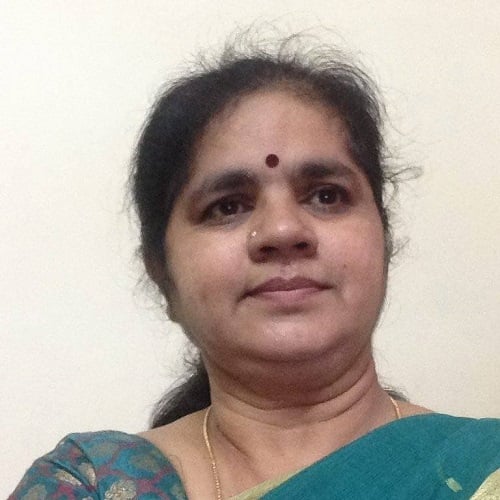
Mrs. Setaluri Padmavathi, a postgraduate in English Literature with a B.Ed., has been in the field of education for more than three decades. Writing has always been her passion that translates itself into poems of different genres, short stories and articles on a variety of themes and topics. She is a bilingual poet and writes poems in Telugu and English. Her poems were published in many international anthologies and can be read on her blogsetaluripadma.wordpress.com. Padmavathi’s poems and other writings regularly appear on Muse India.com. Boloji.com, Science Shore, Setu, InnerChild Press Anthologies and Poemhunter.com
RIVERS, TO THE POINT OF NO RETURN, REVERSE
Muthusami Annamalai
Wide and vast gushenmasse__ the heaven’s tears
We young pals did jump and without fear
It was an abject merriment-show and fair
Tourists and passersby struck to watch in flare
Water-hues turned by sediments and silt in pair
O, it was glorious time with nil despair.
River river flew everywhere bereft of despair
In glee, hale, mirth and wealth glistened with tears
People, peasants gratified their thirst twined to pair
State of rivers started to reverse for fear
Run-off houses, dams cropped up in other’s flare
None dared point the excess that’s not fair.
I saw the spot where water once gave fun-fair
The barren spread of dry motes evoke despair
Each hour I spend on this bank quells the flare
Rushing in abundance the equinoctial tears
How come the river managed its suicidal fear?
Nature left axed the situation to repair.
The bubbling brooks, falling cascades in pair
Were all things of joy forever….a true fair
Where is the ‘forever’?...dwelling in lost fear
Trumpeting in famine with loud despair
Symbolizing drained water with cheek-rolled tears:
Perfect obsequies for the river with flare!
The bush that bore rose and briar…the eye’s flare
Strong against spate of flood both banks stood in pair
Lush green paddy fields and fruits packed with juicy tears
Are all driven to bygone oblivion-fair?
Leaving revenant ghosts hound dance of despair
Indulging in begetting life-stretched and overly fear
Farmers die in swarms, fear, fear in all sides fear
Coracles spin and fidget only in watery dream’s flare
Famished stomachs crave for food in despair
We shall forget You River,that be more fair.
Stepping to shed life renouncing of tears!
Rights of rivers and fear of self….a clumsy pair
With extra flare enact the Vanity Fair
Folks hit with despair learn to swim in tears.
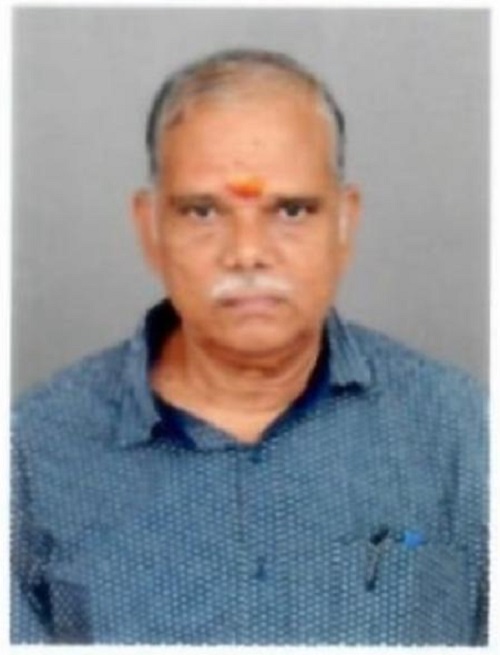
Annamalai M is from Erode in Tamil Nadu. Worked in the state electrical utility . Possesses master degree in English literature . Member of Chennai Poets circle . Had written poems in Tamil and in English. Fond of travel .
Mrutyunjay Sarangi
Everywhere the wind blows gently
And brings a whiff of rare fragrance
Everywhere a breath falls
And plays the song of joy.
Everywhere a footstep treads
And awakens a hope for the future
Everywhere the sight lands
And sprouts a cascade of colour.
To that boundless land of unlimited freedom
Let my country journey in glory and glamour.
May the roses bloom ever brighter
The oceans roar ever louder
The white clouds roll ever gentler
And the green hills stand ever taller.
May the bells chime ever sweeter
The prayers stir the soul ever stronger
The Gods smile on the folks ever kinder
And the mass of people dance ever happier.
To that land of promise and cheer
May my country march in glorious splendor.
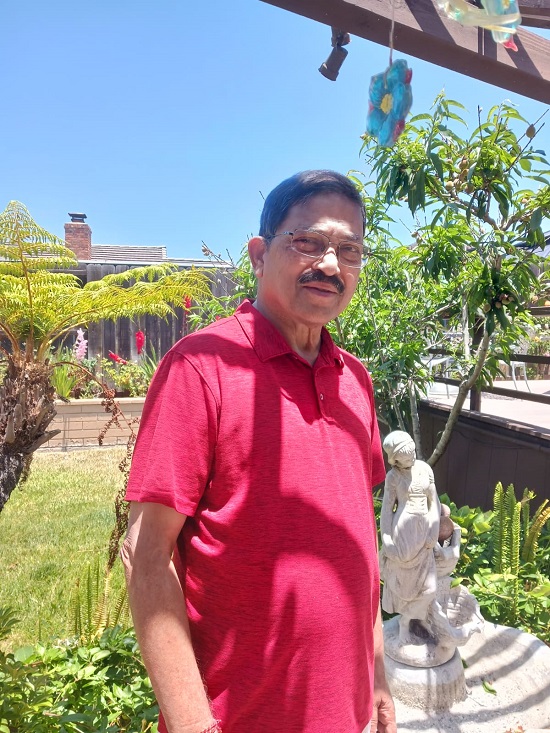
Dr. Mrutyunjay Sarangi is a retired civil servant and a former Judge in a Tribunal. Currently his time is divided between writing poems, short stories and editing the eMagazine LiteraryVibes . Four collections of his short stories in English have been published under the title The Jasmine Girl at Haji Ali, A Train to Kolkata, Anjie, Pat and India's Poor, The Fourth Monkey. He has also to his credit nine books of short stories in Odiya. He has won a couple of awards, notably the Fakir Mohan Senapati Award for Short Stories from the Utkal Sahitya Samaj. He lives in Bhubaneswar.
BOOK REVIEWS
THE BARD AND HIS SISTER IN LAW
Ms Gargi Saha
From childhood I was fascinated by Tagore stories and today reading, The Bard and His Sister in law by MallikaSengupta and translated by Lopamudra Banerjee, I am totally transfixed by the historical, biographical, nonfiction which takes us back to the lives of the characters amid the backdrop of the Renaissance in Bengal.
KabirBouthan focuses on the multifaceted history of the illustrousJorasankoThakurbari, Kolkata. the birthplace of Noble Laureate, Rabindranath Tagore. The narrrative chronicles the interpersonal relationships between men and women inside that mansion and their personal jouneys which became historically significant in terms of the development of gender and culture studies of the pre independence era in India and also in terms of development of Tagore's poetic persona.
The book depicts Tagore's composition of several songs in concordance to the mood of the situation. Tagore known as 'Rabi' was loved by his sister in laws Gynanda and Kadambari. Kadambari was also known as 'NotunBouthan 'meaning newly married bride. Rabi had deep affection for Kadambari.In fact after Kadambari's first attempt to commit suicide, Rabi composed the lines in his long poem titled, 'Suicide of the Star '.
After Rabi married Mrinalini, when they were together in conjugal love, Rabi felt Kadambari appeared standing in front of him like a fairy, a faint apparition. Rabi asked her to leave, as a new episode of their life had begun. At Rabi's request Kadambari melted into nothingness leaving JorasankoThakurbari to a new realm of happiness, joy and prosperity.
The book is a mosaic of history and hysteria, elan and illusions, pathos and power, a fitting description of the KabirBouthan. .
I enjoyed the dramatic and inspiring transformation of women like Gyanadanandini, who is a symbol of emancipation of women from the clutches of traditions, myths, superstitions and illiteracy. Her husband Satyendranath gave wings to her imagination and freedom. She visited many places with her husband, got acquainted with many people, whose customs, culture she tried to emulate. She also travelled alone to England with her children, when she was pregnant. Hats off to her courage.
Gyanadanandini slowly got 'Westernised'. She learnt to drape her sari in neat pleats, to pin up her pallu and wear socks. Gradually even jackets, now known as blouses were paired with the sari. However she had the grief of losing three children.
Another female character, Kadambari loved Jyoti dearly and her affinity for her young brother in law was influenced by her husband's great affection for him.Jyotirindranath loved everything created by his little brother, who had no interest in academic studies , but was devoted to literature. According to this book the marriage actually began to deteriorate in England, when Jyoti slowly turned cold towards his wife and she began suspecting him of having affairs with other women. When Jyoti married Kadambari, Gyanada (sister in law) came in conflict with Kadambari being constantly belittled for her failure to produce offspring.
The book presents the practice of sons-in-law moving into the Thakurbari, instead of the daughters moving out. JorasankoThakurbari was extremely conservative with women themselves perpetuating patriarchal practices even though they read infinite books bought home to them by Malini , the book seller.
Binodini, a beautiful actress is a victim to men of higher strata for wealth, sex, avarice. The women and men have themselves inspired the journeys of many people in Bengal and women have played pioneering roles in shaping the contours of society beyond their lifetimes and these phenomenal journeys form the premise of this book.
While reading the title of the book,' The Bard and His Sister in law ' I felt that the book was about the relationship between young Rabi and his beautiful sister in law ,Kadambari. But it is actually the story of women of Tagore's household at Jorasanko in Kolkata across three to four generations.
The occupants of the Thakurbari were originally Vaishnavites but later Debendranath had initiated himself to the BrahmoSamaj rejecting all forms of idol worship.
I must congratulate Lopamudra Banerjee for providing substantial descriptions of the lives of the women of the Thakurbari. I am grateful to her for translating this book into English and building bridges between cultures.It allowed myriad non Bengali readers to experience the cultural phenomena which would otherwise be too foreign and remote to grasp through one's cultural lens.
I was fascinated by the book's evolution in dress and fashion, changes in food habits, their travels to Gujrat, Mumbai and abroad. In the beginning women were behind the purdah the 'Andarmahal' but with time many emerged to dance at parties, drink alcohol, much to the chagrin of traditional Bengali society.Most of the book's nineteen chapters are titled after women or female characters like Bioyini or Birohini.
I am grateful to Lopamudra Banerjee for translating this classic book which unfolds the subtle nuances of the socio political history of Bengal in those times while retaining its originality in characterization, theme and plot. I wish her all success in future endeavours in enriching the garden of English and Bengali literature.

Ms Gargi Saha is a creative writer and has published two poem books namely, 'The Muse in My Salad Days ', and 'Letters to Him '.Her poems have been featured in National and International Journals. She has received the Rabindranath Tagore Memorial Award and the Independence Day Award for poetry. Presently she edits several scientific research papers. She can be reached at gargi.paik@gmail.com
Shrabana Adhikari

Book Review of A Life Uprooted : A Bengali Dalit Refugee Remembers translated by Mandakini Bhattacharya and JaydeepSarangi of JatinBala’s autobiography Sikorh-Chennera-Jibon
By- Shrabana Adhikari
TITLE OF THE BOOK :
A Life Uprooted : A Bengali Dalit Refugee Remembers translated by Mandakini Bhattacharya & Jaydeep Sarangi
Bengali Title : Sikorh- Chennra – Jiban by Jatin Bala
Name of Publisher – Sahitya Academy
Year of Publication-2022
ISBN N0-978935548404
PRICE-280
Dalits have been oppressed since centuries and even in this 21st century they have been treated as less than human beings. Due to the varnashrama system , they have been put into the margin. Their literature is not at all considered as worthy as the mainstream literature which is embellished with various qualities like Rasa, Dhwani, Tatwa. The eminent Marathi Dalit writer Sharankumar Limbale very clearly explains the distinct position of Dalit Literature within the vast corpus of literature in his seminal work Towards an Aesthetics of Dalit Literature :
Dalit literature is not pleasure-giving literature. Consequently, the
aesthetics of Dalit literature cannot be based on the principles of
anaestheticist literature that privileges pleasure derived from beauty.
That is why there is a felt need for a separate Dalit aesthetics. ( 116)
The literature of Dalits is mostly written in vernacular languages or transcribed from their oral literature. What is more surprising is that in this postcolonial India, they are still voiceless entity. Moreover, very few women dalit writers are coming up who can transform their excruciating pain and internal bleeding through their fiery thoughts and writings. So, it is the need of the hour to give voice to the voiceless and that is why translation of the dalit writings from regional dialects into English is a kind of a social responsibility and moral commitment to give voice to these downtrodden people and to give back their rights to live with dignity.
Although Maharashtra is the birth place of Dalit Panther movement (1972-1979) which is considered as the torch bearer of Dalit literature, this particular wave also created a new realm in other states like Karnataka, Andhra Pradesh, TamilNadu and West Bengal. However, Dalit movement in Bengal has its unique dimension as it is interspersed with the most striking incident of Indian history,i.e. Partition. In the book Under my dark skin Flows a Red River, Debi Chatterjee highlights this particular issue in the introductory part:
Following the Partition, most Namasudras residing in the eastern
Districts of Bengal preferred to stay on in East Pakistan, which they
Considered to be their ‘homeland’; however, by the 1950s riots that
Broke out in East Pakistan, and the mounting communal tensions in
The region, led to the mass exodus of Dalits, who headed to West
Bengal. They became refugees. They lost their homes, their sources of
Livelihood and their country. (xix).
The dalit literature in West Bengal gained its prominence during 1990s with the contribution of renowned writers like Manohar Mouli Biswas, Manoranjan Byapari, Jatin Bala, Nakul Mallik ,Kapil Krishna Thakur , Manju Bala, Kalyani Thakur Charal etc in the field of poetry, short stories, drama and autobiographies. Dalit autobiographies like Surviving in My World by Manohar Mouli Biswas, Interrogating My Chandal Life by Manoranjan Bypari, The Life Story of a Rickshawpuller by Raju Das, Why Do I Write Charal by Kalyani Thakur Charal are the panoramic illustration of gruesome reality and inhumane sufferings of dalit people resulted from the oppression by upper caste people. Besides some important magazines like ChaturthaDuniya, Dalit Kantho, Jagarn etc shaped the corpus of dalit literary movement and thus it also helps in the rapid expansion of Dalit literature in Bengal.
Jatin Bala, a prolific Bengali Dalit writer, born in Jessore , a part of East Pakistan (Bangladesh) recounts the harrowing experience of Namashudra community after the political event ,i.e. partition in his autobiographical fiction Sikarh -Chhenrha – Jeeban (2018 2ndedn) translated as A Life Uprooted: A Bengali Dalit RefugeeRemembers (2022) by two great academics and translators Mandakini Bhattacharya and Jaydeep Sarangi. In the introductory part of the translated version it is clearly mentioned that this piece of writing is ‘the first authentic Dalit refugee autobiography published in India, incorporates the identities of both the refugee and the exile.’( xiv). Bala has not only recollected and recorded his own traumatic experience during partition but also represented the terrible circumstances that Dalit community had gone through for a long period of time as they were evicted from their ‘ homeland’ and they were entrapped in the cobweb of identity crisis, class and caste discrimination , communal tension and hellacious condition in a new place where their existence is like living dead almost like ghosts.
In this context Manoranjan Byapari refers to the real condition of Namashudra community in post partition scenario in the seminal article Is there a Dalit Writing in Bangla :
The present population of namashudras is nearly two crores. Prior to
1947 almost 90 percent of them lived in East Bengal in the districts of
Khulna, Faridpur ,Jessore and Barishal. Their history after partition is
Well known. The fear of communal violence drove them away from
villages. In the darkness of night they crossed the border, leaving
behind their land, houses and all material possessions. Year after year
they lived under tress, on pavements, on railway platforms, in refugee
camps- existing at a substance level. ( 4117).
This autobiographical novel of Bala, consisted of 27 chapters, can be considered as a documentary of the refugee crisis in post – independence India in general and psychological exigencies of dalit people in particular. Throughout this fictional narrative, the writer has meticulously portrayed the forlorn state of himself as a child who lost his parents at an early age and also how this child entered into adolescence while witnessing the horrifying incidents that took place in three camps- Kunti Transit Camp, Bhandarhati Workside Camp, and Bolagarh Refugee Camp in a new land. The transition of his life is very much congruous with the transition of social political situation in post partition period. Each and every chapter of this fiction is tinged with the incessant trauma that the writer holds from crossing the border to his journey to resettling in an another place for preserving the cultural, social and moral rights. The beginning of the memoir is very catchy in the sense that Bala has chosen the word ‘fire’ – F…I…R…E F…I…R…E F…I…R…E H…E…L…P H…E…L…P H…E…L…P (Bala1) . The people of Bolpota village in Jessore district , East Pakistan, are in utter despair and they seek help of one another in 1954. This ‘fire’ is never extinguished in the wider sense as the rift between Hindu community and Muslim community and upper caste and lower caste exists forever following this disastrous political decision of dividing the nation. This incident also becomes the cause of the forced migration of Dalit people from this ideal village life.
The writer has very aptly and metaphorically used the symbol of ‘sapling’. The life of refugees is like uprooting of a sapling and place it in a new place where it struggles a lot for its proper growth. Partition leads to the migration of million people and their homeless, helpless situation which is vividly described by Bala in the 11thchapter .It can be regarded as the climactic part of the entire fictional account-
Partition not only changes geographical boundaries and maps- It rends
apart men’s minds and the heart of a nation. What is known as
Partition in politics actually signifies for the people exile from the
homeland, becoming rootless, watching neighbours turn strangers,
becoming a suspect for one’s relatives, losing faith. ( Bala 75).
What is important to note that the upper caste rich people of East Pakistan did not face any difficulty in replacing their life in West Bengal as they had enough resources and relatives in the then Calcutta. So, the lower class people(belonging toNamashudracommunity ) became the worst victim of this displacement . They were sent from one place to another like commercial goods via train or lorry. In chapter 15thBala recollects one such experience of caste distinction in a train which was stuffed in uncountable refugees after coming to West Bengal :“Oh, these ripus are destroying the nation!”.( Bala123).
Bala has become the mouthpiece of his community with the progression of the narrative. In chapter 21 entitled ‘In Search of Enlightenment’, he has created several characters who explain the discourse of inhuman suffering of dalit refugees who were sent ‘at Dandakaranya, a dense forest full of wild animals, situated in Central India.’ ( Bala 192). They were devoid of their basic rights as it is said by Dhiman Gossai “Why are we deprived of all human rights? Why are Dalit lives wasted no end?” ( Bala 196). He also added : ‘There are very few people who demand justice and truth for Dalits.’ ( Bala 197). Bala as a school boy went through various kind of torture and even he worked as labour in the field so that he contributed something to this elder brother’s ( Mejdaa) family. One day, being starved and feeble, Bala as a ten years old boy could not properly do his work in the field and he was wounded by the arrow of words of the upper caste land owner:
“If you cannot work , why do you come? You rotten carcass, son of a ripu , why do you come?” ( Bala 209).
Towards the end of the memoir, the problem of rehabilitation of dalit refugees is highlighted in Bolagarh Refugee Camp. Here the writer illustrates the brutal torture of the soldier on a dalit refugee woman called Ashimamashi. She protested against the policies of government . This results into barbaric exploitation of the old woman that Balanarrates : “ I see the other side of Ahimamashi is being beaten up and dragged towards the train by five armed soldiers and one associate of the Camp officer…..Ashimamashi groans and cries in pain , saying ‘please do not beat me, you have already taken my son away from me; I beg of you, please leave me.”(Bala 240).
At the end of the novel, Bala was beaten up by the police. His body became numb and his was severely injured. Although he could not move, he kept moving forward with indomitable courage ‘ I keep crawling, ahead. In my defiant eyes is a blazing F….I…R…E ( Bala 288). The inextinguishable fire of revolutionary approach of dalit people against the class and caste prejudice of Indian society continues till today.
To sum up , the translators have done a commendable job. They are very much committed in preserving the cultural undertone of this memoir. They have kept the Baangal words and some Bangla words and provide a glossary in the translated form to create a harmony and to maintain the nuances of the Bengali language as it is also essential for interpreting the text critically. Even in the postcolonial India , we often come across the inhumane sufferings of people belonging to Dalit community. So, it is the need of the hour to give our attention to this kind of text. It is really a socio cultural accountability of the researchers, academicians, readers, critics to rethink about the caste related issues and take step against the violent oppression so that we can build a better world outside our academia where equity will be no more a dream but everyone’s right. Translation has its own lacunas but here the translators endeavor greatly to add a new feather in the oeuvres of Dalit Literature in English translation. This particular piece definitely requires Indian and global readership for the promotion of Dalit literary aesthetics.
Works Cited
Bala, Jatin. A Life Uprooted: A Bengali Dalit Refugee Remembers. Translated by Mandakini Bhattacharya & Jaydeep Sarangi, New Delhi: Sahitya Akademi, 2022.
Limbale, Sharankumar. Towards an aesthetics of Dalit Literature. New Delhi: Orient Black Swan, 2022.
Mukherjee, Debi Chatterjee and Sipra, editors and translators. Under my dark skin Flows A Red River. Kolkata: Mandira Sen for SAMMYA , 2021.
Mukherjee, Manoranjan Byapari and Meenakshi. "Is There Dalit Writing in Bangla?" (n.d.).
—. "Is There Dalit Writing in Bangla?" Economic and Political Weekly (2007): 4116-4120.

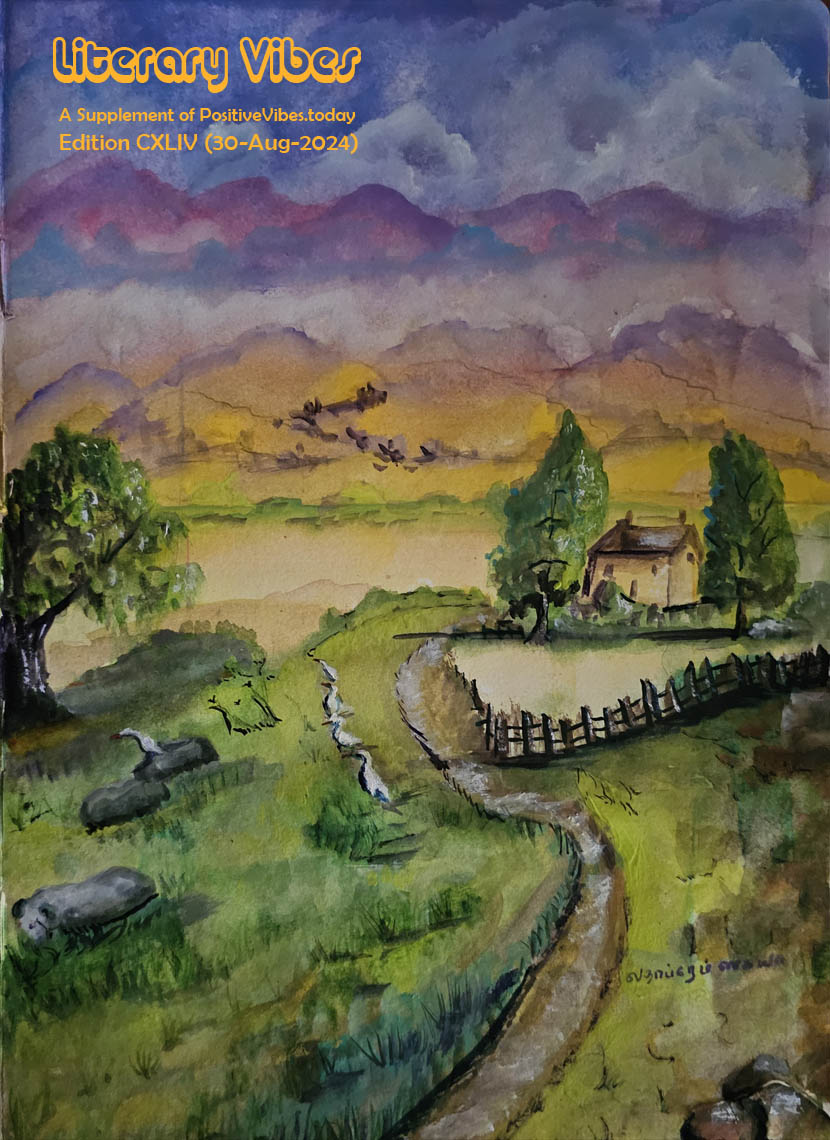
Viewers Comments